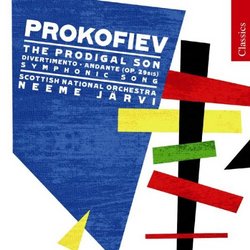| All Artists: Sergey Prokofiev, Neeme Järvi, Scottish National Orchestra Title: Prokofiev: The Prodigal Son Members Wishing: 0 Total Copies: 0 Label: Chandos Original Release Date: 1/1/2008 Re-Release Date: 8/26/2008 Genre: Classical Styles: Ballets & Dances, Ballets, Historical Periods, Modern, 20th, & 21st Century, Symphonies Number of Discs: 1 SwapaCD Credits: 1 UPC: 095115148624 |
Search - Sergey Prokofiev, Neeme Järvi, Scottish National Orchestra :: Prokofiev: The Prodigal Son
 | Sergey Prokofiev, Neeme Järvi, Scottish National Orchestra Prokofiev: The Prodigal Son Genre: Classical |
Larger Image |
CD Details |
CD ReviewsA Mid-Price Reissue of a Lauded 1990 Recording J Scott Morrison | Middlebury VT, USA | 09/12/2008 (5 out of 5 stars) "This disc is one of a series of reissues of Prokofiev orchestral music with Neeme Järvi conducting the Royal Scottish National Orchestra, originally issued in the early 1990s to almost universal acclaim. This particular disc contains some of Prokofiev's best but least-known music: The ballet 'The Prodigal Son'; the Andante, Op. 29bis; Symphonic Song, Op. 57; and Divertimento, Op. 43. The longest by far is The Prodigal Son, written 1928 while Prokofiev was still living in the West. It was his last work commissioned by Diaghilev. It retells the biblical story of the prodigal son, but the scenarist Boris Kochno adds a seductive Siren and omits the envious older brother of the Bible story. A small portion of the music was later used in Prokofiev's Fourth Symphony. The ballet is in ten scenes chronicling the prodigal's departure, his involvement with the Siren, his debauchery and drunkenness, his 'awakening and remorse', and his return home. The ballet has been in the repertoire of both the New York City Ballet and the Royal Ballet of London. The most famous protagonist has been Rudolf Nureyev who danced it in London in 1973. The music, here played with grace, fluidity and power by Järvi and the RSNO, is one of Prokofiev's best ballet scores and it is a shame that it is not played as often as its better-known siblings, Romeo and Juliet or Cinderella.
The eight-minute 1934 'Andante' is an orchestration of the middle movement of Prokofiev's 1917 Fourth Piano Sonata, but had its origin even earlier (1908) in a youthful symphony written while Prokofiev was still studying at the St. Petersburg Conservatory. It incorporates two disparate themes, one majestic, one lyrical, and then combines them in the work's final pages. 'Symphonic Song' from 1933 is a somber thirteen-minute work in three sections played without pause. Prokofiev says the three sections represent Darkness, Struggle and Achievement. This might seem to fit the agitprop Socialist Realism agenda, but in fact sounds much more agonized and less immediately palatable than that; the Achievement section is not all sweetness and light, but recalls the bitter struggle that precedes it. It is a strong work which one appreciates more on repeated hearings, but it has had very few public performances. One is happy that Järvi has resurrected it. The final work on the disc, the sixteen-minute four-movement 'Divertimento' from 1929, has a hybrid origin. The first and third movements come from an earlier ballet, 'Trapeze' and were originally orchestrated for a mixed instrumental quintet but fleshed out for this work, the second movement larghetto was composed specially for this work, and the finale is material originally intended for 'The Prodigal Son'. Prokofiev's sweet-tart lyricism and his melancholy sarcasm are much in evidence as are, unusually for him, echoes of Stravinskyan orchestration. These works are all worth hearing and in the case of 'The Prodigal Son' absolutely necessary for anyone caring about Prokofiev's orchestral oeuvre. Järvi and the RNSO prove themselves once again to be marvelously able to convey Prokofiev's musical message. Sonics are quite acceptable by today's standards. Scott Morrison" |
